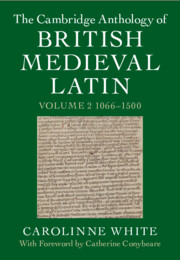Book contents
- Frontmatter
- Contents
- List of Maps
- Foreword
- List of Abbreviations
- Introduction
- Eleventh Century
- Twelfth Century
- Thirteenth Century
- II.21 Gerald of Wales
- II.22 Jocelin of Brakelond, The Chronicle of the Deeds of Abbot Samson
- II.23 Scientific Teaching of the Twelfth Century
- II.24 Matthew Paris, The Major Chronicles: King John Offers His Kingdom to the Caliph of Morocco
- II.25 Magna Carta
- II.26 Roger de Montbegon: a Life in Administrative Documents
- II.27 Edmund of Abingdon
- II.28 The Study of Latin and Other Languages
- II.29 A Miracle Associated with St John of Beverley: a Boy Falls from the Minster Roof
- II.30 The 1297 Visitation of Chiswick Church by the Authorities of St Paul’s Cathedral
- Fourteenth Century
- Fifteenth Century
- Select Bibliography for Volume II
- General Index
- Index of Passages Cited
II.25 - Magna Carta
from Thirteenth Century
Published online by Cambridge University Press: 11 January 2024
- Frontmatter
- Contents
- List of Maps
- Foreword
- List of Abbreviations
- Introduction
- Eleventh Century
- Twelfth Century
- Thirteenth Century
- II.21 Gerald of Wales
- II.22 Jocelin of Brakelond, The Chronicle of the Deeds of Abbot Samson
- II.23 Scientific Teaching of the Twelfth Century
- II.24 Matthew Paris, The Major Chronicles: King John Offers His Kingdom to the Caliph of Morocco
- II.25 Magna Carta
- II.26 Roger de Montbegon: a Life in Administrative Documents
- II.27 Edmund of Abingdon
- II.28 The Study of Latin and Other Languages
- II.29 A Miracle Associated with St John of Beverley: a Boy Falls from the Minster Roof
- II.30 The 1297 Visitation of Chiswick Church by the Authorities of St Paul’s Cathedral
- Fourteenth Century
- Fifteenth Century
- Select Bibliography for Volume II
- General Index
- Index of Passages Cited
Summary
The Magna Carta is probably the most famous British document, composed in Latin in 1215 to record the agreement between king John and his barons regarding the king’s responsibilities and the rights of the people. Here several clauses are excerpted from the 1225 version published under king Henry III, with references given to the clauses in the 1215 version. These clauses relate to women’s incomes, the right to basic maintenance, standardisation of weights and measures, the problems caused by obstructions in rivers, each person’s right to a swift and fair trial, and freedom of movement for foreign traders.
Keywords
- Type
- Chapter
- Information
- The Cambridge Anthology of British Medieval Latin , pp. 247 - 251Publisher: Cambridge University PressPrint publication year: 2024

